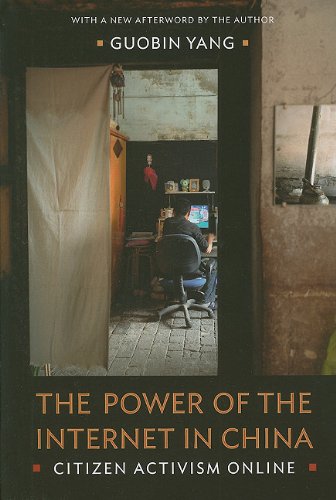杨国斌:The Power of the Internet in China
 The Power of the Internet in China: Citizen Activism Online by Guobin Yang, Columbia University Press, June 2009
The Power of the Internet in China: Citizen Activism Online by Guobin Yang, Columbia University Press, June 2009
Since the mid-1990s, the Internet has revolutionized popular expression in China, enabling users to organize, protest, and influence public opinion in unprecedented ways. Despite efforts to control these activities, online activism has been an agent of immense social change, allowing common citizens to disseminate content and openly challenge the authority of political and economic elites.
Guobin Yang’s pioneering study follows the rise of this dynamic protest and the forces that keep it relevant and unique. Online activism encompasses an innovative range of rituals, genres, and styles, and state efforts to constrain it have only led to more creative acts of subversion. Internet businesses have encouraged these contentious activities, generating an unusual synergy between capitalism and civil organizations that sponsor critique. Based on ten years of meticulous research and grounded in theories of social movements and the public sphere, Yang’s study emphasizes the mutual shaping of technology and society and highlights the important role of a transnational diaspora in the making of a Chinese Internet culture. In conclusion, Yang argues that online activism reflects important structural changes in contemporary China and points to a new era of informational politics.
Guobin Yang is an associate professor in the Department of Asian and Middle Eastern Cultures at Barnard College, Columbia University. He is coeditor, with Ching Kwan Lee, of Re-envisioning the Chinese Revolution: The Politics and Poetics of Collective Memories in Reform China.
“A boundary-breaking book. . . . A snap review of some of the hottest issues in front of the Chinese public today.” — Daniel Little, Understanding Society
“Mr. Yang’s work is essential reading.” — Rebecca MacKinnon, Far Eastern Economic Review
“This work represents a major advancement in scholarly research. . . unquestionably, it should be on reading lists for courses related to social and political development in China. . . it is highly recommended to all. ” — Jonathan Sullivan, The China Quarterly
“Of interest to sociologists and students of mass communications . . . Recommended.” — Choice
“Essential reading for all those seeking a more nuanced account of the power of the internet in China than that provided by international media and human rights organizations.” — Colin Hawes, The China Journal
“Yang develops a lens that centers on concrete issues and situations that are both empirical-practical and conceptual-theoretical.” — Peter Marolt, International Journal of Communication
“The Power of the Internet in China by Yang Guobin is destined to be classic and obligatory reading for anyone interested in understanding the role of the internet in people’s struggle for freedom, justice, and democracy in China.” — Lokman Tsui, China Information
“The Power of the Internet in China offers us not only a rich study of Chinese
online activism but also raises significant questions about China’s civil society.” — Ming-Cheng Miriam Lo, Contemporary Sociology
“An attentive and richly detailed study of the Chinese Internet—certainly the best book I’ve read on the subject. Guobin Yang does a very fine job of summarizing new developments and vividly describing a variety of online communities.” — Patricia M. Thornton, University of Oxford
“In today’s China, who benefits more from the power of the Internet: citizen activists or state authorities? Guobin Yang comes down decisively on the side of the citizenry, seeing online activism as the revival of a Chinese revolutionary spirit that is setting the stage for the long-awaited democratic breakthrough. Although the conclusion of this richly documented study is certainly controversial, the careful research and clear reasoning are incontrovertible. Whether or not Yang’s optimistic prognosis proves correct, his excellent scholarship and engaging style make for an impressive contribution to a timely debate.” — Elizabeth J. Perry, Henry Rosovsky Professor of Government, Harvard University
“Much has been written about the role the Internet has played in political campaigns and grassroots politics in America, but the real transformative power of the Internet can be seen in places like China and Iran, where authoritarian governments are faced with the irreversible power of individuals coming together online. This book gives an in-depth look at the explosion of Internet use in China and the dramatic political and cultural changes it has enabled. The ultimate instrument of individual empowerment is remaking one of the most controlling societies on earth. What Chinese leadership will be forced to recognize is that this democratic surge must be accommodated. Failure to do so will either stop economic development or result in the current regime’s loss of power.” — Governor Howard Dean
“Transformations in China and transformations of communication are two of the great stories of the contemporary era. They come together in Guobin Yang’s outstanding study of online activism in the People’s Republic. The Internet expands activists’ sense of themselves as participants in global movements, and it is used in distinctively Chinese ways. It circulates repertoires of collective action and occasions new forms of action. In this well-researched and well-written book, Yang gives the best account available of this experimentation, innovation, and social change.” — Craig Calhoun, president, Social Science Research Council, and University Professor of the Social Sciences, New York University
